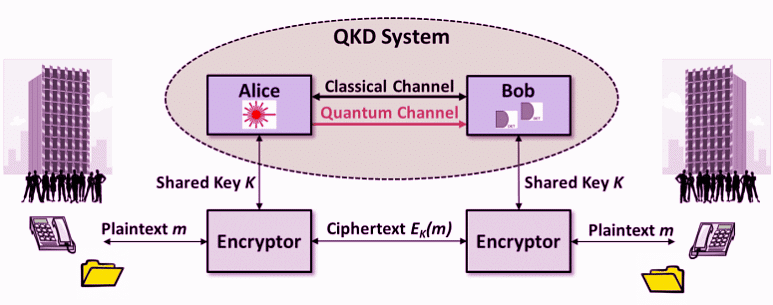Quantum Cryptography | Science & Technology for UPSC CSE PDF Download
| Table of contents |

|
| Introduction |

|
| What is Quantum Key Distribution (QKD)? |

|
| How Does QKD Work? |

|
| Significance of QKD Technology |

|
Introduction
Traditional encryption relies on mathematical algorithms for securing data, but the emergence of quantum computing poses a threat to its security. Quantum Key Distribution (QKD) technology, based on the principles of quantum mechanics, offers a groundbreaking solution. Recently, the Defence Research and Development Organisation (DRDO) successfully demonstrated QKD communication between two of its labs, the Defence Research and Development Laboratory (DRDL) and the Research Centre Imarat (RCI).
What is Quantum Key Distribution (QKD)?
QKD leverages the principles of quantum mechanics to encrypt data and create a virtually unhackable communication system. Unlike traditional encryption, which relies on mathematical algorithms, QKD uses the unique properties of quantum particles, such as photons, to establish secure communication channels.
How Does QKD Work?
QKD functions through the following steps:
- Photon-Based Data Transfer: QKD uses photons, the particles responsible for transmitting light, to transfer data between two parties.
- Secret Key Generation: Two distant users, who initially do not share a secret key, employ QKD to produce a common, random string of secret bits known as a secret key.
- One-Time Pad Encryption: The generated secret key is proven to be secure, and it is used to encrypt and decrypt messages. The encryption technique used is the one-time pad encryption, known for its exceptional security.
- Transmission: The encrypted message can then be safely transmitted over a standard communication channel.
 |
Download the notes
Quantum Cryptography
|
Download as PDF |
Significance of QKD Technology
QKD technology carries significant implications for data security and cybersecurity:
- Unbreakable Encryption: The security of QKD is based on the fundamental properties of quantum particles. A photon cannot be perfectly copied, and any attempt to measure it will inevitably disturb it. This makes QKD encryption practically unbreakable.
- Traceable Interception Attempts: If someone attempts to intercept the data being transmitted via QKD, they will leave a trace due to the disturbance caused by measuring the quantum particles. This traceability enhances the security of communication.
- Cybersecurity Advancements: QKD has the potential to revolutionize cybersecurity, making data breaches and cyberattacks significantly more challenging for malicious actors.
- Government Communication: While beneficial for businesses, QKD also poses challenges for governments seeking to intercept and monitor communication. This technology can potentially protect sensitive government information from hacking attempts.
In summary, Quantum Key Distribution (QKD) technology utilizes the principles of quantum mechanics to create a highly secure and virtually unhackable method of data encryption. It relies on the properties of quantum particles like photons to establish secret keys for encryption and decryption. QKD has the potential to significantly enhance cybersecurity and protect sensitive information from unauthorized access, making it a game-changer in the field of data security.
|
114 videos|431 docs|209 tests
|
FAQs on Quantum Cryptography - Science & Technology for UPSC CSE
| 1. What is Quantum Key Distribution (QKD)? |  |
| 2. How does QKD work? |  |
| 3. What is the significance of QKD technology? |  |
| 4. How is QKD different from traditional encryption methods? |  |
| 5. Can QKD technology be implemented in real-world scenarios? |  |














